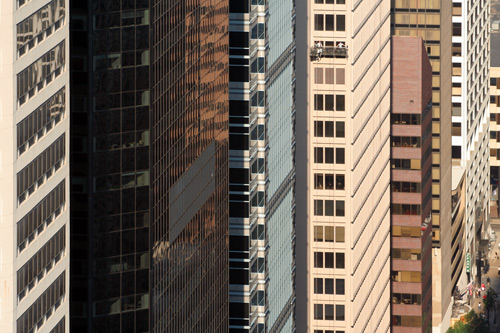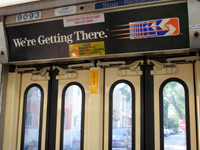
by Nathaniel Popkin
August 22, 2007
"Now these are scary thoughts, they are -- that [Clinton], or some Democrat, can take your money and they're going to use it for the common good." So said
Rudolph Giuliani after the May 15 Republican presidential debate, as reported by Peter Boyer in last week's New Yorker.
Pretty standard stuff, right? The simplified marking of ideological territory, like Giuliani's own use of the Nixon-era "socialized medicine" to refer to any
government intrusion into the health care system.
Now Tuesday's New York Times reports that average income fell
1% between 2000 and 2005. Actually, the Times' headline was "Average incomes fell for most (my italics) in 2000-5." The real story here is widening
income disparity. Remove the massive gains among the top quarter of one percent of earners and real income fell even more for the vast majority of Americans.
Times writer David Cay Johnson goes on to cite a report by Citizens for Tax Justice that shows the impact of President Bush's tax cuts on investment
income. Millionaires reaped 62% of overall tax savings; the super-rich enjoyed $1.7 million each in savings (the 90% of Americans who earn less than $100,000 a
year were rewarded with an average $319 tax reduction).
It's easy, of course, to muse about the ways government might use the $21.7 billion the federal government gave the richest 11,433 Americans in 2005. If only we
could decide what problem of the common good to attack first -- infant mortality, life expectancy, crumbling
infrastructure, mine safety, public transportation, education, global warming, hell I'll even add in port and chemical plant security -- and maybe some extra
security x-rays at Philadelphia
International Airport. Here we've crystallized a point of ideology. What ought to be more important to society -- gratuitous private consumption or the
general well-being? You, with your cheap tickets to Santo Domingo ($119 one-way!), standing in an endless security line -- and not grumbling -- at PHL, do you
see the connection?
Yet for us here, the discussion of income disparity and tax policy ought to be more nuanced -- ultimately, it points to interesting tensions between America and the rest of the West. Suffice it to say that what we're all
interested in -- the Philadelphia built environment -- has benefited substantially from Bush tax policy. The three major residential projects currently under
construction -- Murano, 10 Rittenhouse, and Ritz-Carlton -- will tap right into that $21.7 billion. Indeed, from smallish developers like David Grasso to major
institutions like the University of Pennsylvania, with its enormous trove of super-rich donors, Philadelphia is amassing treasures of the current gilded age.
Corporations, too, are benefiting from the Bush program -- Comcast Center and the future Comcast
2 are almost certainly made possible by low taxes (and some subsidies) on corporations.
All this investment -- just try to get your arms around what has taken place since the mid-nineties, it is mind-boggling -- has made Philly nicer for many. More
money at the top makes Di Bruno's and Capogiro and Foster's home store possible; it means PMA expands, the Barnes moves in, the Jewish Museum arrives. It means,
at long last -- thanks to some strategic public investments -- there is real possibility in all that long-elusive and yet tantalizingly palpable
potential.
This is no small thing. During the Bush years Philadelphia -- after thirty years of small but not insignificant investments in certain neighborhoods -- finally
adopted a new outlook. The city looks good, feels larger, seems livelier (the thousands of sidewalk tables help). Out-migration continues but immigration has
increased. Now immigrants finally comprise a significant portion of the population, a key indicator of health for an American city. People are coming here again
and that, in turn, further alters the narrative. Would this have happened without tax policy that favors the rich? It's a difficult question, of course, but the
way I see it, low taxes freed up a lot of money to pay architects, designers, and builders, who in sequence benefited from the tax cuts.
 But more money at the top also means social and economic injustice continues; that's
the real crux of the ideological trade-off. When we don't take your money
the common good suffers. It surely is suffering today -- so much so that a desperate fatalism seems to have descended on so many Philadelphia streets; and like a
low pressure system, it just sits no matter the proclamations. Much of the city is indeed a wreck. Septa fights to survive (certainly not to expand as it
should); the Governor wants to sell the Turnpike; DHS struggles to address the intricate pain of poverty; the School District is some $100 million in debt. To
make it worse, because there just isn't enough revenue to run the city properly, let alone solve some of these more intrinsic problems, the casino -- or rather
the slot warehouse, that colossal FU to the progressive Philadelphian -- is tapped to make up for the shortfall. So he who wishes for justice,
above all, and then, secondly, for a decent, stimulating urban environment is taking it twice. So that those who are already profiting from the income
reallocation will profit some more. And your aunt Marie, who already spends too many Tuesday nights in Atlantic City, can lose it all just a few feet from her
stoop. But more money at the top also means social and economic injustice continues; that's
the real crux of the ideological trade-off. When we don't take your money
the common good suffers. It surely is suffering today -- so much so that a desperate fatalism seems to have descended on so many Philadelphia streets; and like a
low pressure system, it just sits no matter the proclamations. Much of the city is indeed a wreck. Septa fights to survive (certainly not to expand as it
should); the Governor wants to sell the Turnpike; DHS struggles to address the intricate pain of poverty; the School District is some $100 million in debt. To
make it worse, because there just isn't enough revenue to run the city properly, let alone solve some of these more intrinsic problems, the casino -- or rather
the slot warehouse, that colossal FU to the progressive Philadelphian -- is tapped to make up for the shortfall. So he who wishes for justice,
above all, and then, secondly, for a decent, stimulating urban environment is taking it twice. So that those who are already profiting from the income
reallocation will profit some more. And your aunt Marie, who already spends too many Tuesday nights in Atlantic City, can lose it all just a few feet from her
stoop.
It is a complicated equation. The rest of the West isn't burdened with defense spending or a weekly $2.4 billion war bill, or with the mythic imperative of
individualism. Europe makes its public investments; the rich, like everyone else, benefit. Even Italy, in constant political instability, provides efficient
health care for its citizens. Should a Democrat win next November it is likely she is going to take some of your money for the common good. Taxes will be raised
substantially. So is there a third way -- some manner of restoring the common good while continuing to entice investment in the city's still-built
environment?
The answer depends on many factors of course, not the least is our ability -- and that of other cities -- to reinsert city life into the narrative of America.
European cities don't fight suburbs (or each other, largely) for resources. Their value goes without saying. Assuming a Democratic counter-reallocation of
income, we're going to have to persuade suddenly less-flush investors that the future is in West Philadelphia and not West Deptford. The best way to do that will
be to make visionary public investments in infrastructure and the built-environment. Large, inventive projects will draw private dollars -- and maybe, thinking
broadly of course, we'll find true synergy between individual, entrepreneurial action and the widest possible common good.
–Nathaniel Popkin
nathaniel.popkin@gmail.com
|